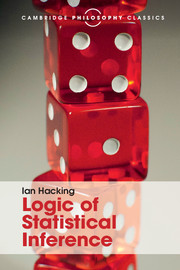Book contents
4 - The long run
Published online by Cambridge University Press: 05 July 2016
Summary
The logic for support will serve as the underlying logic for our definition of chance. So now we seek connexions between support and long run frequency. There is one connexion which has usually seemed too obvious to be worth the stating, but this whole chapter is devoted to it. It serves to bring out the rôle, or lack of rôle, of the concept of the ‘long run’ in statistical inference and in reasoning about chances. Statisticians have usually been interested in new discoveries, but a philosophical inquiry into foundations has to begin with what everyone else takes for granted.
The suitor of the last chapter guessed who wrote a letter; he knew only that one correspondent writes more often than another. It seems part of our very understanding of frequency in the long run, that if A happens more often than B, and one or the other must have happened, then the best guess is A. This sounds correct no matter what one means by the long run. It does not follow from Kolmogoroff's axioms. Should it be derived from another postulate? Must it be postulated on its own? Or is it just false?
The questions are academic. Seldom are frequencies our only data. The world is too complicated and men know too much. Only in the imagination do frequencies serve as the sole basis of action. But it is probable that laws governing imaginary cases operate in life.
Suppose an urn to contain many balls. Most are black; a few white. Experiments show that when a blindfold person draws a ball at random, replaces it, and shakes the urn before redrawing, black appears far more often than white. So suppose this is a chance set-up in which the chance of black greatly exceeds that of white, and in which the result of any draw is independent of any other. If you are to guess about the result of the next draw, or any other, then, on this slender information, your best guess is ‘black’. Why?
Black is best only if you want to guess correctly. I shall take this for granted in the sequel, but perhaps it is not a necessary assumption. Instead of guessing one may speak more formally.
- Type
- Chapter
- Information
- Logic of Statistical Inference , pp. 35 - 47Publisher: Cambridge University PressPrint publication year: 2016

